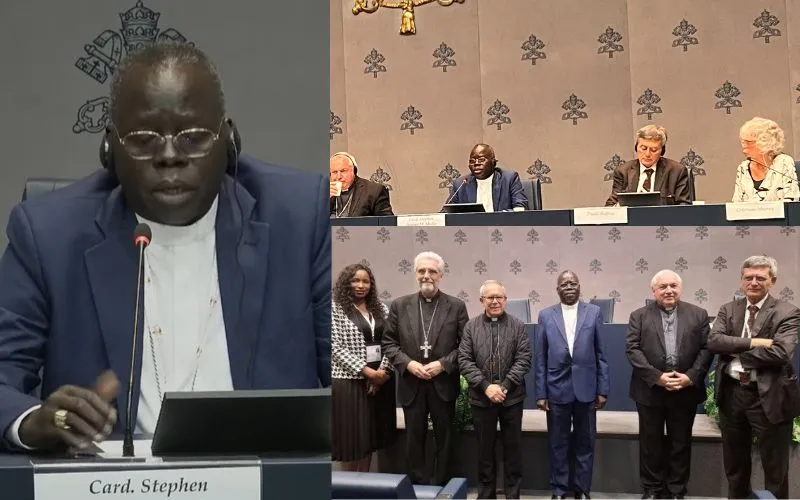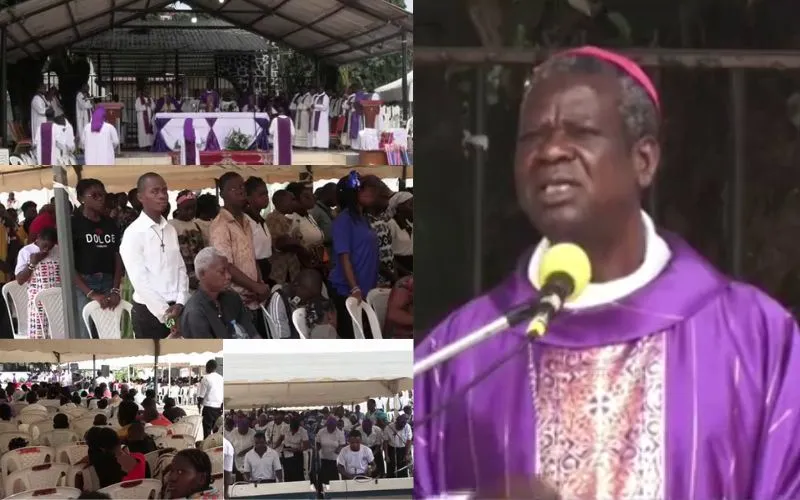Reflecting on the situation in neighboring Sudan with the war that broke out on 15 April 2023, Cardinal Ameyu said Sudan is “bleeding” due to the war.
“The war started in the city of Khartoum, and many of our church members in Khartoum have been displaced, including the Archbishop of Khartoum, who is in Port Sudan,” he said.
He said, “Many churches were damaged, and many properties of the church were all destroyed.”
He continued, “In Sudan, two generals just decided to bring war on people, and, as a result, many people have lost their lives and many properties have been destroyed. Some of you have been in Khartoum, you wouldn’t (recognize) Khartoum any longer, they’ve bombed down all those buildings because the rebels are there, nobody is safe in Khartoum,” he lamented.
“We are suffering from people who want power, but not service. The result of the war in South Sudan and Sudan is all because people want a place to sit,” the Cardinal said.
(Story continues below)
He said, “That is one thing that this synod on synodality is emphasizing: we are not leaders in order to rule people, we’re leaders in order to serve people, this is clear in the synod.”
“It is for this reason that it is important to dialogue, without dialogue we cannot settle things in the church nor in the political arena. Synodality, going together, is the way for us to resolve our own problems,” Cardinal Ameyu said.
The Cardinal also addressed the devastating impact of global warming on South Sudan.
He noted that flooding has submerged entire cities, displacing communities for years.
“A lot of cities have been submerged, and many people are suffering,” he said, recounting how floods have compounded the country’s ongoing social and political instability.
The Cardinal lauded Pope Francis for sending Michael Cardinal Czerny, Prefect for the Vatican Dicastery for Promoting Integral Human Development (DPIHD) to South Sudan to witness the devastation firsthand, underscoring the Church’s commitment to addressing environmental issues alongside political and social concerns.
He called for global collaboration to address issues such as ethnic and religious intolerance, social injustice, and environmental degradation.
“Problems that affect Sudan, or South Sudan, or Colombia, or other parts of the Mediterranean countries, are our problems,” he said, stressing the interconnectedness of global crises.
He added, “We are related, interrelated, and dialogue has to happen. We must feel about these situations. The people who are perishing in the Mediterranean Sea are all people because they wanted a better life. If this better life is provided for them in their own country, it would be better.”
“But again, most of the time you discover that people in their own countries are not received well or are not maintained well because of lack of transparency and lack of proper governance. And so it is for this reason that we have to resolve problems globally because we are affected globally,” he said.
Cardinal Ameyu also noted the importance of addressing the issue of polygamy in Africa, which was discussed during the continental phase of the Synod.
“For us, the problem of polygamy is not only in one country but all over Africa. So we thought that we can also discuss this question as outlining the issue of the church in Africa. I think it found support from all our colleagues, delegations from different countries and continents,” he explained.
The Local Ordinary of Juba said, “A problem that belongs to Africa must be treated as a global problem. It is like other problems that you have here in Europe and people cannot localize it only to be in Europe.”
“In fact, the goodness of the synod this time was that there is this aspect of openness to all issues which are problems of humanity. And so that openness is very important because we as a church, we are to be pastoral agents,” he said.
He continued, “Whether in Africa or in Europe, we are to be pastoral agents. So the pastoral agent should be careful of the problems of humanity all over the world. And this dialogue of cultures has helped us to see positively to all those problems that we have all over the world.”
Cardinal Ameyu emphasized, “The Church's teaching in regard to matrimony remains the same. But caring about families which are polygamous is a very important thing for us in Africa.”
Jude Atemanke is a Cameroonian journalist with a passion for Catholic Church communication. He holds a Bachelor’s Degree in Journalism and Mass Communication from the University of Buea in Cameroon. Currently, Jude serves as a journalist for ACI Africa.








